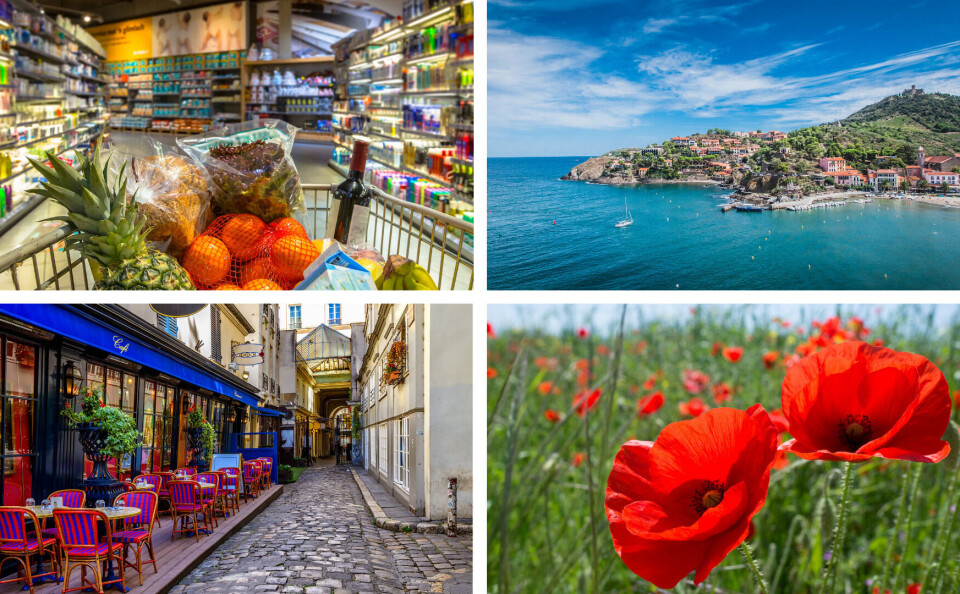-
La Voie Bleue: European Cycle Route of the Year is in France
700km bike path linking Luxembourg and Lyon has been crowned winner of the 2026 title
-
Before and after: Garonne river floods in south-west France
Satellite images show extent of flooding from back-to-back storms in February
-
Home insurance increases expected in France after floods
Compensation costs for the recent storms and flooding across the west and south-west is estimated to be in the billions of euros
It was not all bad: French news that may bring a smile to your face
Our weekly feel-good round-up includes more poppies in French fields and outside terraces staying open for three months longer each year

1. More poppies in French fields
Poppy flowers are once again plentiful in French fields, after almost disappearing due to the use of fertilisers and pesticides, according to horticulturalists.
With fewer farmers now using pesticides due to the increased cost, poppies can again be found in abundance.
Many farmers have now also turned to organic pesticides, which are less dangerous for the plants, and some other pesticides have been banned altogether, leading to a healthier environment for the flowers to grow in.
On top of this, an increase in available field space (caused by fewer crops being grown) has given more room for the flowers to flourish.
Poppy seeds may also be found in old varieties of wheat seeds, with the two living harmoniously together in fields.
Poppies can lie dormant for years before making a comeback, so could even pop up where you least expect them.
The poppies’ resurgence “is a positive sign for biodiversity, a sign of greater respect for the environment [in France],” said horticulturist Jean-Luc Laurent.
Read also: Fine increase for not clearing your French garden to prevent wildfire
2. Reservoir boost for department under harshest drought restrictions
There was a glimmer of good news in the southern department of Pyrénées-Orientales, which is among the areas of France that have been hit hardest by a record-breaking winter dry spell.
The Connexion has reported on the communes that have been without drinking water and the fact some areas are under the strictest drought conditions.
But increased rainfall this month has seen the Vinça dam fill up, which has allowed water to be released to farmers to irrigate their crops, reports RTL. It will also be used to help the shallowest water tables.
However, the department has urged caution and drought restrictions are not expected to be eased for the time being.
“The rest of the department and especially the Agly valley is still very dry,” said Nicolas Garcia, vice-president of the department.
Elsewhere, groundwater levels in around a dozen French departments - mainly in the north - are considered to be high.
Last month it was reported groundwater levels in more than two-thirds of departments were below average levels for this time of year.
Read more: This is how the government wants you to save water this summer
3. Cheaper food prices in July as inflation passes peak
Inflation levels have reached their peak and should begin to fall in the second half of the year, according to the Banque de France.
Year-on-year inflation was 5.1% overall in May but reached 14.1% when it came to food prices.
In light of this, Finance Minister Bruno Le Maire promised that July would see food prices fall for hundreds of items, thanks to a new commitment from major food suppliers.
Some of the products mentioned by Mr Le Maire that will see lower prices include pasta, cereals, oils, and poultry – products for which “prices on wholesale markets are falling”.
The government will “verify” that producers keep their promises, and “sanction” those who do not lower prices, he added.
Despite wholesale prices falling, it can sometimes take months for this to correspond to a fall in food prices for consumers, but the government is pushing to make sure shoppers see the benefits.
The Banque de France also said French GDP grew 0.1% in the second quarter of 2023.
Read also: Low-cost supermarket set to open three new stores in France
4. Lyon’s outside terraces can open for longer
An online consultation into restaurant and bar terraces in Lyon has led to changes to how long – and at what time of the year – they can stay open.
They can now open from March to November – previously they could only be installed between May and October.
On Sundays through to Tuesdays, all terraces in the city will close at midnight, but on other days can stay open until 1:00.
The changes provide a “balance between neighbourhood vitality and the peace and quiet of local residents", said Lyon mayor Grégory Doucet.
Additional changes mean terraces in certain areas of the city can open from 10:00 instead of 11:00, and single-use plastic tableware will be banned in terraced areas.
A 1.5-metre pedestrian walkway must also be present to allow easy access for walkers and those with disabilities.
Read more: What happened to France’s ban on restaurant terrace heaters?
5. ’Food vouchers’ for low-income families to be launched next month
Vouchers to help low-income families “eat better” are set to be introduced by the French government in July.
“Our aim is to respond to food emergencies… [by offering vouchers] that would be paid to recipients of minimum social benefits," said MP Francesca Pasquini.
Those who receive RSA, AAH, or ASPA benefits will be eligible to receive the vouchers, which will have a value of €50 per month.
One additional perk of the vouchers is their flexibility; they can be used at supermarkets, and “give people the choice to… buy what they consider to be good for their health,” said the MP.
For the time being, those eligible will have to apply for the vouchers through CAF (Caisse d'allocations familiales).
Related articles
French supermarket Carrefour trials vouchers-for-recycling scheme
























